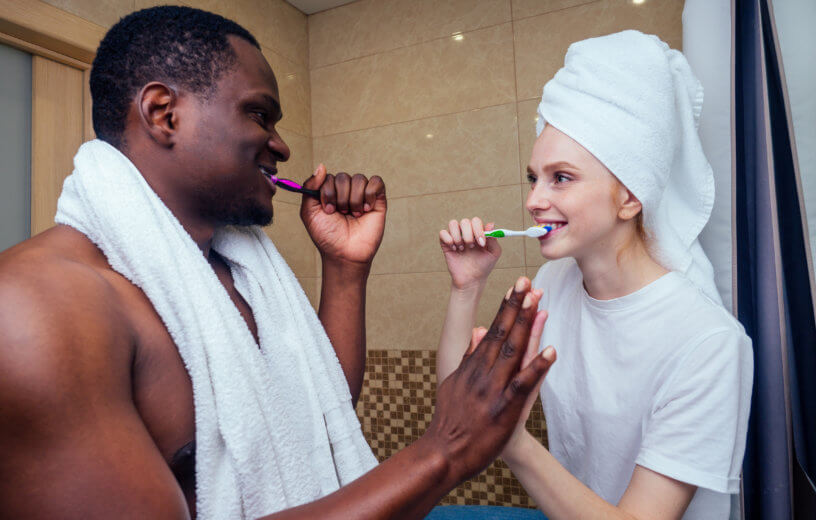CHRISTCHURCH, England — If you’re of the mindset that sharing a bed with your partner means it’s perfectly fine to share a bath towel too, you’re in good company, a recent survey on bathroom habits shows. But that doesn’t make it a smart idea. That’s because research has found that 90% of bathroom towels are contaminated with fecal bacteria, and 14% of them contain traces of E. coli, a potentially deadly bacterium.
The survey of 250 British adults, conducted by the bathroom product company Drench, finds that 56% of couples share their towels, potentially putting themselves at risk for contracting a bacterial infection. The study also shows that 26% of couples start sharing towels within the first month of getting together. On the other hand, 36% say they’d never share towels.
The survey also asked respondents about bathroom usage. About three in ten women aren’t comfortable sharing any kind of bathroom issues with their partners until at least seven months into their relationship, with 22% saying they’ll always be uncomfortable. On the other side, 32% of men said they’re perfectly comfortable discussing toilet issues with their significant others — after only one month! That’s compared to 15% of women who’d talk about potty problems and other bathroom concerns with a partner in the first month.
Another interesting tidbit from the study is one’s comfort in leaving the bathroom door open while using it. That’s something that 23% of men say they’ll do within the first month of being in a relationship, compared to eight percent of women. Overall, 63% of the couples surveyed currently leave the bathroom door open while using it.
Feel comfortable enough to do your potty duties while your better half is in the bathroom too? The survey showed that 36% of long-term couples said they waited at least seven months to use the toilet while their partner was in the bathroom with them. And 18% of men would even use the toilet while their partner is in the shower or bath, compared to only four percent of women.
Other findings from the survey: 21% of women say they’d never remove their make-up in front of their significant other — while 22% of men who use cosmetics say the same! And while 29% don’t mind showing their natural faces within the first week of a new relationship, only 26% of men are just as brave.
When it comes to bathroom bugaboos, 40% of women cited not cleaning the toilet after use as what annoyed them the most. For men, 34% say that hair clogging the drain is the most annoying. No female survey respondents said that “nothing” bothered them in the bathroom, while four percent of men were unbothered.

The researchers gathered some tips from respondents who have been in relationships for at least five years and came away with these takeaways:
- Almost half (45%) of long-term couples remove make-up in front of their partner under a month and over a quarter (27%) in the first week, indicating you need trust and to feel confident around your partner if a relationship is to work.
- 2 in 5 of the couples who’ve been together for 5+ years felt comfortable around toilet issues within the first 6 months, suggesting if it takes any longer than this the relationship might not have much trust.
- If you feel comfortable around your partner, you could wait at least 2 months to use the toilet with the door open, such as 30% of couples. Or if that’s not your thing, don’t do it at all like 37% of long-term couples.
- Some things take a lot more trust even for the healthiest relationships. 36% of long-term couples, said they waited at least 7 months before using the toilet while their partner was in the bathroom.
So if you’re not sure what the future holds for your relationship, consider your bathroom behavior. That might tell you all you need to know!
